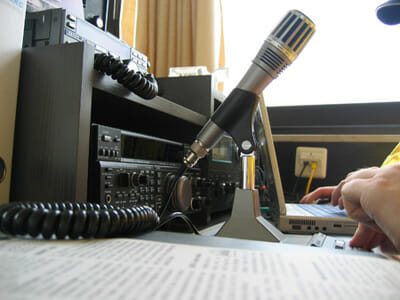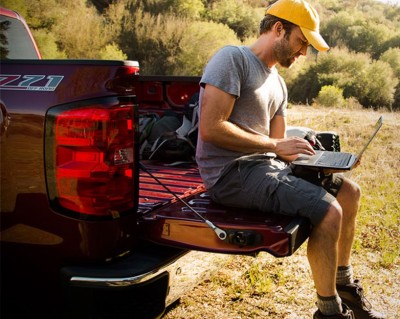The Internet is an integral part of modern life. We use it for countless things – emailing Mom, buying a new pair of boots, reading the latest news. And it’s probably hard to imagine life without it.
But what if you move into the “middle of nowhere”? Or what if an emergency or disaster situation knocks out our electrical grid, chances are that most people would lose – or think they have lost – their Internet access. However, even without power, there might be a way you can still get online thanks to massive power banks and generators specifically designed to back up the data that appears online.
The trick is to know how.
What You Need at Home
Most of us receive Internet access through our phone lines or our cable TV subscriptions. In either case, the transmission of the signal to your home is the responsibility of the provider, not you. As I mentioned, phone companies generally have massive stores of back-up power. So, if you are getting broadband through the phone company, you should still have Internet access from your home.
New Lantern Provides 100,000 Hours of Emergency Backup Lighting With No Open Flames
Cable TV subscribers aren’t quite so fortunate. Even if the cable TV company has power generators at their office, that won’t be enough to provide Internet service throughout their network. These companies count on signal amplifiers along the way, which are mounted on power poles and powered by tapping into the electric power lines. With the grid down, they won’t be able to provide any Internet access.
Your Electric Power
Since we’re talking about an outage or off-grid situation, you can’t count on electricity from the power company to power your computers and devices. That means you’ll need devices that are battery powered, with a means to recharge them. Or you’ll need some sort of power generator at your home.
 The other thing you need to provide power for is your modem or router. These allow you to connect to the Internet. Let’s examine four ways to connect to the Internet off-grid.
The other thing you need to provide power for is your modem or router. These allow you to connect to the Internet. Let’s examine four ways to connect to the Internet off-grid.
1. Connect Via Your Cell phone
Your cell phone is probably the easiest way to connect to the Internet while you are off-the-grid. Not only does your service provider have a connection that you can access through your cellphone, but your smartphone can be used as a wireless hub, allowing other computer devices to connect to the Internet. This means you’re not limited to the screen of your smartphone.
Of course, the ability to use a smartphone to access the Internet will be largely dependent upon having a good cell phone signal. If you’re standing on the top of a mountain or hiding out in a deep canyon somewhere out in the wild, there’s a good chance that you won’t have any coverage.
2. Connect Via Satellite Internet
Satellite Internet is one service that will likely not be affected by any problems here on Earth. It doesn’t matter if we’re talking about the grid going down or having to bug out, satellite Internet should still be in operation.
Another nice thing about satellite Internet is that it doesn’t matter if you’re on the top or bottom of that mountain. You’ll still have Internet access. About the only thing that could affect service is to be somewhere that the signal is blocked, so don’t try to use it from underground.
3. Connect Via Ham Radio
Ham radio — which was around long before the Internet — can be used to surf the web. Sailors often use it at sea. All that is needed is to find a way to deal with some technical problems. (Recommended: The Best Way To Communicate When The Power’s Out.)
 Traditionally, ham radio has been the most reliable means of communication during any disaster. That makes it an ideal venue for attempting to provide Internet access to people in an emergency.
Traditionally, ham radio has been the most reliable means of communication during any disaster. That makes it an ideal venue for attempting to provide Internet access to people in an emergency.
4. Connect Via Dial-Up Internet
Remember dial-up? Yep, it’s still available, even though it has its limits (such as not being able easily to watch videos). More than 2 million Americans are still using dial-up, saving lots of money along the way. Dial-up would work for a while when the electricity is out because landlines would still be working. Landlines are “powered” by the phone company, allowing them to operate when, for instance, a storm knocks out electricity to your town.
Internet Connections of the Future
One of the many projects of our wireless companies and Internet service providers is to develop a true nationwide Wi-Fi network. There have been reports that they intend to use every wireless device in every home as a Wi-Fi hotspot, providing true coast-to-coast mobile coverage. Of course, there be will many privacy concerns with such a system.
Another experimental program is being developed by Space X, the private space flight company. They have just received government approval to install a constellation of low altitude satellites, specifically for providing worldwide Internet access.
This isn’t the first time that something like this has been proposed. Other companies have either looked at the possibility or even made some strides towards launching a satellite. But in all cases, the program has failed. Developers say the big difference this time is that the plan is being fostered by a company that sends rockets up into space regularly.
Don’t give up on the Internet, even if off grid or even in a crisis situation. There are ways of connecting and there will probably be service available to use. The key is to have the right sort of equipment and connections available for what you will need.
Do you know of other ways to get Internet service, off-grid? Share your tips in the section below:
Are You Ready For Blackouts When A Solar Storm Hits Earth? Read More Here.
 Off The Grid News Better Ideas For Off The Grid Living
Off The Grid News Better Ideas For Off The Grid Living




